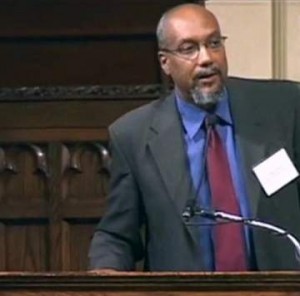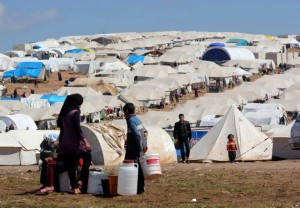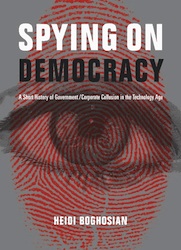Podcast: Play in new window | Download
Updates:
- Lynne Stewart’s September Letter
- National Lawyers Guild Letter Urging Compassionate Release For Lynne Stewart
- Chuck D Performance In Philadelphia and Mumia Protest
- US Pulling Back From War?
- NSA Shares US Intel With Israel – Guardian
- Barrett Brown Case: Gag Order
—–
Spying on Democracy: Government Surveillance, Corporate Power, and Public Resistance Part II
This is part 2 of our interview with our own Heidi Boghosian who wrote the newly published book is titled Spying On Democracy: Government Surveillance, Corporate Power, and Public Resistance and it reveals in detail how the government acquires your information from sources such as telecommunications companies to compile a data base on “persons of interest.” Since ex-CIA staffer Edward Snowden’s release of top secret documents to the Guardian and Washington Post many are now aware of the frequency and scope to which they are being monitored. What this book has unveiled is how your personal consumer data is being gathered, bundled and sold. The spying, the collecting of phone records, accessing your online activity, all of it is unconstitutional says Heidi Boghosian, co-host of Law and Disorder and the National Lawyers Guild’s Executive Director.
- They create dossiers of our spending habits, of our communication habits.
- The corporations benefit from this which makes them create more equipment for surveillance and almost makes it impossible for the government to perform traditional government functions because they’re so reliant on corporate partners.
- There’s also a revolving door among CEOs of these big companies and high level positions within government intelligence.
- The National Lawyers Guild was spied on by the FBI. More than 1000 agents were assigned to us for nearly 3 decades. They rummaged through our members garbage. We had an infiltrator in Washington DC serving as a staff person.
- They tried to label us (and failed) as a subversive organization.
- The People’s Law Office had also been monitored for years. Apparently across the street from the office an apartment was taken by the FBI who spied on them for their work representing politically active individuals.
- With all of this spying, the chilling effect of knowing that you may be spied on, you conversations may be listened to, changes the way you do business.
- I’ve always been interested in cooperation between municipal public police and private security organizations.
- We’re seeing an entire industry giving birth to Stratfor and other intelligence organizations that exist just to conduct intelligence be it on activists or critics of corporate or government policies, as well as defense contractors beefing up and creating a whole sector of intelligence.
- They are in big contracts with the US government.
- One of the problems constitutionally is they’re not held as private businesses to the same strictures as the US Constitution as we saw recently with the Hemisphere program revelations. We have our government paying AT&T staff to sit next to drug enforcement officers and go through AT&T’s files that go back 26 years. They’re not overseen by a judge.
- My question is how many more agencies of the government are doing this?
- They are getting access to this information through what’s called administrative subpoenas.
- Many mannequins have small cameras embedded in the eyeballs.
- When you’re spying on the fourth estate as its called which is intended to be a watch dog on government you really get to the heart of what democracy is about.
- Without a free press, we don’t have any chance of preserving those fundamental freedoms of First Amendment association and the ability to bring our grievances to the government for redress.
- A student group working with the Coalition of Immokalee Workers got suspicious because a new member on their listserve started asking questions and they did some research and found she owned her own private security company, in fact she was spying on them for Burger King.
- Congress is calling for an investigation for these large data aggragators. Once again, there’s no oversight, there’s no accountability, they go to a variety of sources to gather personal information on us. Some in the public domain, others not.
- They have vast troves, electronic dossiers on each of us.
Guest – Heidi Boghosian, executive director of the National Lawyers Guild. She is the co-host of the weekly civil liberties radio show Law and Disorder on Pacifica’s WBAI in New York and over 40 national affiliates. She received her JD from Temple Law School where she was the editor-in-chief of the Temple Political & Civil Rights Law Review. She also holds an MS from Boston University and a BA from Brown University.
—–


Syria: U.S. Humanitarian Intervention
What is the difference between an illegal war and humanitarian intervention? At the 2005 United Nations World Summit, government leaders agreed unanimously that “each individual State has the responsibility to protect its populations from genocide, war crimes, ethnic cleansing and crimes against humanity.” If a state fails to protect its own citizens from such atrocity as its known, the agreement implies a collective responsibility of humanitarian intervention upon other agencies. President Obama has threatened to use military force against Syria and recently commented during a speech that “we cannot and must not turn a blind eye to what happened in Damascus” The US, however has in the past, turned a so called blind eye to other alleged chemical weapons attacks in other countries. Why would President Obama now want to go forward with a Navy missile strike in Syria and try to do so without UN Security Council approval?
- There’s no basis in international law that allows the US or any sovereign state to take that kind of unilateral action.
- This notion of humanitarian intervention and this responsibility to protect, is a particular type of creation that’s been cooked up in the west that has provided some kind of moral justification to engage in unilateral action on behalf of the world community.
- To circumvent the United Nations and impose their own vision and understanding of international order on any nation they see fit.
- This is no more than a dressed up, rearticulation of the white man’s burden.
- This notion that the US and the European, ex-colonial nations, have a right and a responsibility to impose their particular interests and world views on the rest of humanity is a notion that needs to be rejected but its something that many people in the west have embraced.
- It was the foundation for the NATO intervention of Libya. It has been the justification for intervention in Kosovo.
- It’s been very skillfully implanted into the minds of many people in this country as a justification for unilateral actions on the part of the US or in conjunction again with European allies.
- What about the images we were bombarded with, the rows of piled up bodies in Egypt? Why are those lives less important than those who died in Syria?
- Is it the mode in which they were murdered, gas as opposed to US supplied weapons?
- I think the US objective is the dismemberment of the Syrian state. They are in almost a win-win situation. Either they affect regime change and allow this motley crew of oppositional forces much aligned with jihadist movements, come to power or they force the state to become a non-functional state.
- The long term objective is to further isolate Iran, to diminish the power of Russia.
- Right at the moment when it was clear that the Assad government had turned the tide militarily on the ground, the US decided it was going to intervene to effect the equalization of forces in Syria.
- The US found itself in a very unique isolated position. Kerry has been given an opportunity to pull back from this ill-advised strike.
- I think the Obama Administration is one of the most effective weapons ever deployed against the progressive and radical movement here in this country, perhaps in the whole post-war period.
- He had been the answer to Ronald Reagan, but even a more effective communicator.
- A more effective demobilzer if you will. (Obama Administration) has demobilized the anti-war movement, it has disarmed radicals, confused traditional liberals.
- I think we use this last incident to intensify the conversations around exposing the interests of this administration.
Guest – Ajamu Baraka, Longtime activist, veteran of Black Liberation Movement, Human Rights defender, Former founding director of US Human Rights Network, currently Public Intervenon for Human Rights with Green Shadow Cabinet, member of Coordinating Committee of Black Left Unity Network and Associate Fellow at IPS.
———————————————————————–

